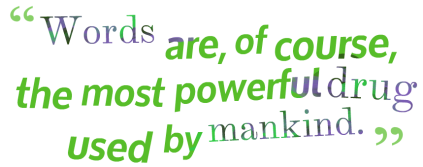Caution- This post contains words that may be considered offensive.
As readers and writers we know how powerful words can be. Words can make you happy or extremely miserable. Words can melt your heart or freeze it. As a linguist I may have an even more acute awareness of how powerful words can be and how we all should be more careful about how we use them.
I’m a romance writer, but I must confess I am not exactly in love with most of the romance novels being published today. I have a few favorites and I hope to find a few more as I read through the thousands of romances out there–both indie or traditionally published. For some time I thought the reason why I didn’t like many of the romances–including some written by very popular authors–was because a lot of them center their plot around sex scenes. But recently I came to realize that I was wrong. It is not the often overwhelming quantity of sex the characters in many novels are having, but the words used to express it.

My current read is a dystopian romance written in collaboration between two pretty successful and popular romance writers. I came across it accidentally when I was desperately seeking other adult dystopian romances like my latest, Heart’s Prey (most of them are targeted at young adults). After I read the blurb, I was truly intrigued by the premises for the plot and decided to read it.
But let me back up a little bit. I am from an older generation (and no, I’m not geriatric quite yet) and a different culture. I was brought up to believe that words hold meaning and connotations, and that there are certain words you should never use unless totally necessary. Enter words like fuck, dick, pussy and others that are commonly used in today’s romance novels when describing a sex scene. These are all words I have–as many others of my generation and background–associated with a non-romantic sexual act. Maybe a one-night stand, or having sex just because well, it feels good. Or worse, associated with sexual assault. Being a feminist–no, it’s not a dirty word and I have never burned my bras or hated men because of their gender–I also connect those words with men talking about women as purely sexual objects, a word totally devoid of sentiment.
Let me make it clear that I do not endorse the ridiculous language used in romances twenty years ago or more when describing sex or the parts of the body involved in it. But if you are going to describe a woman’s or man’s genitals I much prefer–as clinical as they may sound–to read the words penis or vagina than pussy or dick. To me those words have nothing to do with love-making and everything to do with reducing the other person to a sex object.

I have given up on many romances because I just couldn’t stand the way the author used those words. It made me not respect or like the characters, and if I don’t like the characters I lose my interest in the story. In my current read, which is riddled with all of the above words and more, and has sex on almost every chapter, the words are not stopping me from reading and enjoying it. Why? Because so far (I’m about 70% through the book and I hope it doesn’t disappoint me because it’s a great speculative story) the use of such language is totally appropriate; it is part of the world building. In a world where people have sex just to have babies and where love is a thing of the past, it makes perfect sense that words like love-making get replaced with emotionless words.

I agonize over sex scenes in my own books. Not because I’m a prude, but because I want to describe those moments in a way that shows how the couple feels about each other on a higher level than just the physical. In other words, I want them to make love, not fuck each other.
Have I ever used the above mentioned words? Yes, I have when it was appropriate, when I wanted to emphasize the way a character felt at that moment or when showing disrespect for another. I have used them when I was “building” a character’s personality or wanted to infuse the moment or situation in anger or hate.
I predict, as a linguist, that those words will lose most of their pernicious connotations in a few years. In fact it’s already happening. The twenty-or thirty somethings of today pepper their everyday conversations with them and obviously see nothing wrong with that. I’m not criticizing, just pointing out a fact. Language changes and evolves, with words taking on or losing meanings over time. That’s just the way it goes. However at this moment we are in a sort of overlapping of generations that view these words in very different ways, making it difficult for me to read and enjoy a romance that reeks of unhealthy relationships as I’m sure a younger one will read books like mine and think of them as not romantic, maybe even insipid.
Obviously there isn’t an easy answer for this, but tell me: where do you stand on this subject (no judgement) and do you think this is a generational thing or a passing trend?

For a good laugh check out this Buzzfeed list of sexual words you probably didn’t know existed.


Interesting. I think I fundamentally hold the same view as you and had never really analysed it. I think that I too, associate those words with a physical rather than an emotional act. This may be partly from growing up in a non-swearing family but I don’t think so. I think it is actually because, as you say, I associate them with ‘conquest’ rather than consummation of love.
LikeLiked by 1 person
It sounds silly but I actually have a physical reaction (and not a good one) to the use of such words, lol. I also grew up in a non-swearing family (I don’t think I ever heard my dad say any of those words) and so did my kids (my husband who was a sailor and talked like a sailor, taught himself not to use certain words once he became a dad). Yet, both my kids–now grownup–think nothing of using the F-word in conversation. I know I didn’t teach them that!
LikeLiked by 1 person
I know what you mean–words meant to describe sexual interactions that are used in a derogatory fashion (the word “pussy” immediately comes to mind) make it hard for me to see a positive connotation to them–at the same time, I tend to shy from more clinical terms because they seem too cut-and-dried, and lacking in passion.
For me, it boils down to the fact my own feelings toward sex scenes in stories is changing. I’m leaning toward wanting less graphic sex scenes (and the accompanying terminology) and scenes that are more sensual in nature. And yet everyone has a different definition of these terms too.
I find it particularly interesting that an entire generation of people find certain words more offensive than actual acts of appalling offense. I suspect that whole ‘wash your mouth out with soap’ mentality has a great deal to do with that, but it’s one thing I see in reviews over and over again: someone more offended by the use of language than the explicit violence or sex within a body of work.
LikeLiked by 1 person
I totally agree with you. Even though this post was focused on language, another thing that makes me dislike lots of romance novels is exactly what you mentioned–this fascination with violence and sex. Those two things together make me cringe. How can anyone think that violent sex is sexy or a good thing?
LikeLike
Or that sex is more deserving of censure/tougher ratings than extreme violence? I don’t get it. And like you said, the combination of violence and sex is disturbing.
LikeLiked by 1 person
I can definitely understand your objection to certain words, and they do tend to lean more towards sex for sex’s sake. When it comes to the word vagina though, I hate that. I’m also a feminist and have to object to a word which means sword sheath used to describe any part of a woman.
LikeLiked by 1 person
I actually don’t ever use those words because they sound too clinical and not romantic at all, lol. It makes it sound like a visit to the gynecologist 🙂 Thanks for reading the post.
LikeLike
Great post thaanks
LikeLike